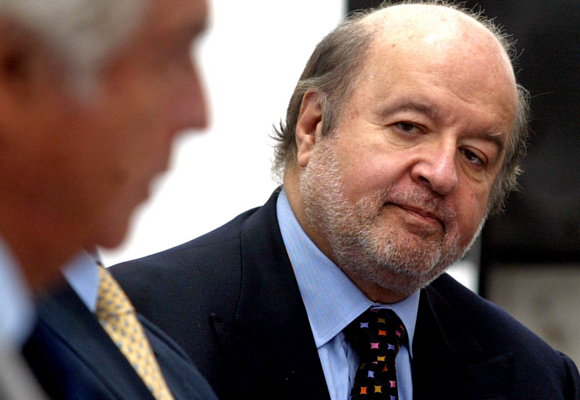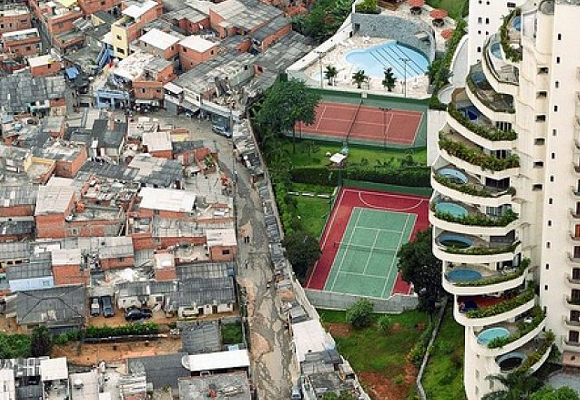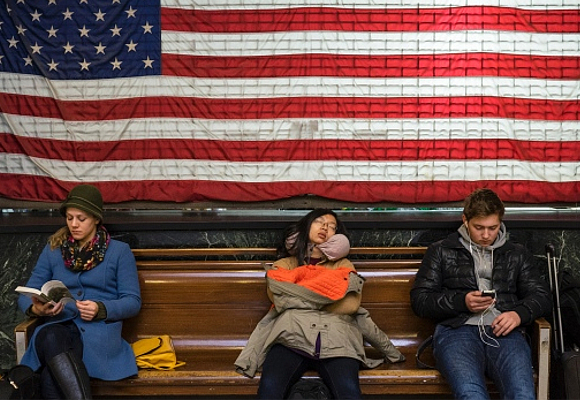Why the Left Doesn’t Like Collaborative Economics
If confidence is a subjective perception, the new warranty system will be sustained necessarily in the sum of perceptions that presently configure the communities of users organized around new technological platforms.
The businessman and adventurer Richard Branson published this week on his personal blog –within the official page of Virgin, the company he presides- an exciting comment about the figure of another economist and adventurer such as himself, Hernando de Soto, with the motive of an encounter that took place in the holiday residency of the English entrepreneur, Necker Island, in the Caribbean paradise of the Virgin Islands. «I was fascinated by his thoughts about ‘informal economy’, as well as listening to him say that property rights constitute the necessary political shield to reduce poverty and fight against terrorism», he confesses at the beginning of his panegyric.
Born in Arequipa, Peru in a home of imminent politicians and literati – distant relatives of Mario Vargas Llosa and members of the government of president Bustamante-, Hernando de Soto studied at the International School of Geneva and was licensed at the Graduate Institute of International Studies. Recognized worldwide for his investigations about the relationship between capitalization and poverty, a firm detractor of State bureaucracy and the efficiency of capital production, he was elected in 1999 by Time Magazine as one of the top 5 innovators in Latin America, and, in 2004 he was considered as one of the top 100 most influential people on the planet. In 2002, Forbes Magazine selected him among as one of the 15 people who will reinvent the future. Currently, he presides the Institute for Liberty and Democracy (ILD), considered by The Economist as one of the two most important think tanks in the world.

Hernando de Soto considers that the biggest obstacle to eradicate poverty in our society comes not from their lack of capital –as the Frenchman Thomas Piketty sustains in Capital in the Twenty-First Century-, but in their incapability to monetize it. Not for lack of talent, or of resources, but by their difficulty to use real estate property as a warranty to acquire loans that enable the growth of businesses and the entrepreneurial spirit.
In that private meeting of the Virgin Islands, the Peruvian man convinced the British man that the Arab Spring of 2011 began as a protest of small producers to the «continuous and arbitrary expropriation of their goods on behalf of the governments and their friends». And not only that. «If we recognize that he people from countries in transition to capitalism aren’t pathetic beggars nor overwhelmed by obsolete habits nor complacent prisoners of dysfunctional cultures, then, why doesn’t capitalism allow them to produce wealth, as in the West? Why does capitalism only prosper in the West, as if it were imprisoned under a crystal bell?», De Soto asks in his book The Mystery of Capital (Sudamericana, 2002). «Capital is the force that elevates productivity of work and that creates the wealth of the nations. Capital is the sap of the capitalist system, the foundation of progress, yet ironically it is precisely that which the poor countries of the world seem to not be able to produce, no matter with how much eagerness their people practice all other activities that define a capitalist economy».

The digits that the Peruvian economist computes are certainly appalling. Even in the least developed countries the poor save, he proclaims with total conviction of the data collected by his investigations team block by block and farm by farm through Asia, Africa, the Middle East, and Latin America. «The volume gathered by the poor is immense: 40 times all the exterior help of the world since 1945. In Egypt, for example, we’ve estimated that the accumulated wealth of the poor is 55 times the sum of all direct foreign investment registered there, the Suez Canal and Aswan Dam included. In Haiti, the most depressed country of Latin America, the total actives of the poor represent over 150 times all the foreign investment received since they gained their independence from France in 1804. If the Unites States elevated their foreign aid budget to the level that the United Nations recommend -0.7% of national income- it would take the riches country in the world over 150 years to transfer to the poor of the world equivalent resources to what they already possess».

But, he warns, it’s a faulty possession: «the homes of the poor are built over properties with inadequately defined owners’ rights, their business aren’t constituted with clear obligations and their industries hide where the financiers and investors can’t see them. Without adequately documented rights, these possessions result in actives that are difficult to turn into capital, they can’t be commercialized outside the close local circles where people have mutual confidence in each other, they don’t work as a warranty for a loan nor as participation in an investment. Without representations, their actives are dead capital».
By dead capital, De Soto doesn’t mean unproductive capital, but that it lacks the warranty of a root good that covers the financial capital of its possible risks. Without a good to impound, without something that compensates, the necessary financing doesn’t flow for the venture. This is the mystery of the capital that the Peruvian economist proclaims.

The peremptorily warranty of the thing is what propitiated the germinated of States as systems in charge of assuring property and free transaction of goods and services. In virtue of which, judicial security is a general principle of Law though which the State grants the individual with the warranty that they, their goods, and their rights will be protected and repaired in the case of them being violated. Judicial security is the certainty of law that receives the individual as an attribute belonging to the State. Because of this, poverty is spatially linked to the countries or regions of our planet where the State of Law is still to be constructed or mature socially and politically.
The legal status of the State can be completed in relatively little time. However, its intellectual status can take centuries or millennia. For it to exist, the necessary confidence in individuals and institutions, until then subject to the discretion of primitivism or to the absolute power of the chief, the householder, or the feudal lord, must germinate in society. Confidence in functional institutions and in the represented collective. Confidence in the liberty of others in feeling, thinking, acting, interchanging goods, services, and ideas.

«Americans have seem to have forgotten that they were once a Third World country as well. Western politicians faced the same dramatic challenges yesterday as the leaders of the Third World and of countries that are leaving communism face today. But their successor only remember an aspect of the era in which the pioneers that opened up the west of the United States where undercapitalized by lack of registered titles of their lands and goods; they’ve forgotten the days in which Adam Smith did his shopping in the black market and the street urchins (the pirañitas or gamines of today) rescued pennies that among laughs tourists threw into the muddy banks of the Thames, and they have erased from their minds the times in which the technocrats of Jean Baptiste Colbert, merchant minister to Louis XIV, executed 16,000 small business owners whose only crime was contravening France’s industrial codes on manufacturing and importing of cotton cloth», Hernando de Soto reminds us.
But, what happens in the digital cloud of the XXI century, where the technological development reached by some individuals, collectives, countries or regions automates the warranty system to the extreme of supplanting the State, or, directly dispenses the State as a warranty intermediary? Aren’t we then talking about the improvement of the State on behalf of the community of users as a postulate of a post capitalism society? The titles of property are not only written and registered, but they are also structured in a corpus of Big Data whose traceability doesn’t require any bureaucracy, or personal intervention, functionaries, public offices.

If confidence is a subjective perception, the new warranty system will be sustained necessarily in the sum of perceptions that presently configure the communities of users organized around new technological platforms. Airbnb and HomeAway in tourism lodging; Uber and Lyft in urban transport, TaskRabbit and Fiverr in labor piecework… These are probably the structures called on to overcome the idea of State in the future and head an organized citizen movement, not in function of territories, but of talent, creativity, culture, art, feelings, abilities, capacities, or personal tastes.
Because yes, as Hernando de Soto sustains, this isn’t access to capital, but its structuring, the essential economic development tool and the overcoming of poverty, this new digital era is signified by a greater capitalization of design and knowledge management. Google, Apple, Microsoft, Facebook, Amazon and other technologies are already more valuable than Exxon, Shell, General Electric, Wells Fargo and other analogical companies. Unlike these, those didn’t demand great financial capitalization, as Thomas Piketty believes. On the contrary, they were mostly born in garages of the middle class. And on blow up mattresses in rented homes.

In our opinion, De Soto should also calculate the dead intellectual capital of the Third World, which could become the great garage of the world, as India and its legion of high demand programmers are proving. Awarding property titles to these intellectual values doesn’t require, as in the case of real estate, the structuring action of States. It is enough with technological connecters in charge of infusing confidence in the system by social monitoring and the scaling and transparent reputation of all its components. Especially when user access begins to charge a growing cost in the face of goods possession.
The digital relational environment will liberate millions of human beings from poverty in the next few years, as South Korea, Singapore, China, India, and other Asian nations are already proving. In this new environment, physical people will start to compete in an economic universe until then reserved to legal entities. A digital environment without common rules, but hence without excluding rules. A more participative environment, more transparent, more inclusive, and more open to the imagination than privileged corporatists.

That’s why the aversion of the political left towards the collaborative economy of the digital era takes us all by surprise. Those who should be the leaders in the fight against poverty are showing themselves without any modesty facing their conservation. Those who should instinctively embrace inclusive economics, promote the political patronage system of dead capital. Those who should lobby for the insertion of disinherited in the market, consciously conceal the monopolistic lobbies and unions. Those who have always vindicated the liberation alienated work, are opposed now to teleworking and working autonomy.
This confused and traditionalist left doesn’t have a future whatsoever in the growing digital society, despite the recent political adventurism. Creative adventure, Richard Branson says, is resumed in promoting the transformation of our world with disruptive and brave ideas. Like those which moved the other Hernando de Soto, the Spanish nobleman who explored Florida, Georgia, both Carolinas and Tennessee, the first European who crossed the Mississippi.
